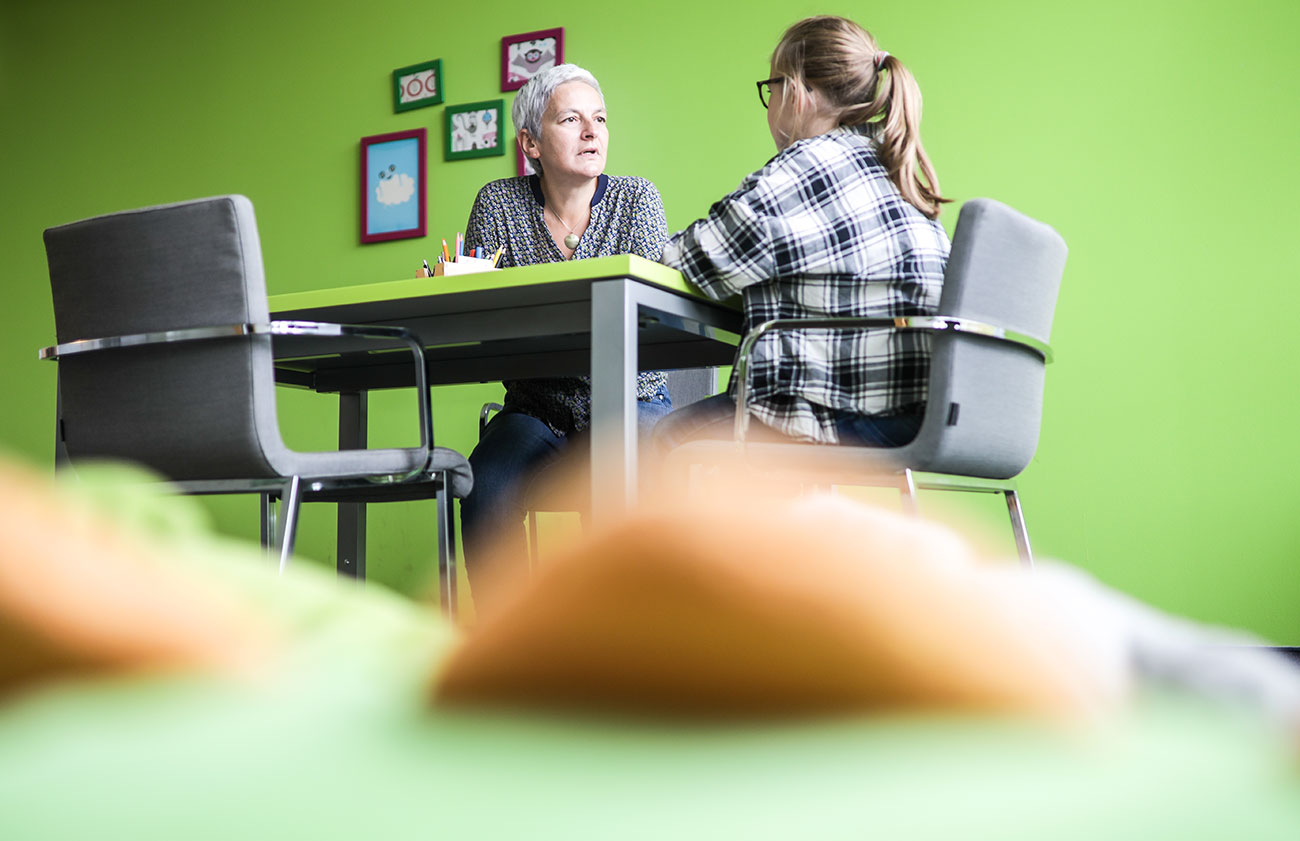
Developmental psychopathology
We are convinced of the idea that understanding mental health requires profound knowledge of typical versus atypical development. Therefore, we investigate how age-related changes in cognitive, social and emotional processes unfold across the lifespan.
We examine how these changes relate to mental health and how the changes can be explained and modulated by the interplay of individual and contextual factors.
Since childhood development lays the foundation for mental health in adulthood, we focus particularly on the period from infancy to adolescence.
Our methods range from cross-sectional comparisons to longitudinal designs; from experiments in the laboratory to ecological momentary assessments in everyday life; from systematic behavioral observation to eye-tracking, physiological measurements (e.g. heart rate, cortisol), EEG and voice analyses.
Five central research topics:
1. Future-oriented cognition and behavior
2. Mechanisms of early learning
3. The role of cultural values and norms in children's mental health, parental perceptions of children's behavior and parent-child interaction
4. Innovation and problem-solving skills
5. Emotion regulation
Head of the research group
Principal Investigator and Team
Leonard K. Kulisch, Prof. Dr. Silvia Schneider, Dr. Babett Voigt (FBZ, RUB, DZPG)
Preregistration
Funding
Deutsche Forschungsgemeinschaft (DFG), Projektnummer GRK-2185/1, DFG-Graduiertenkolleg Situated Cognition)
Duration
June 2023 – May 2026
Description
Separation anxiety disorder (SAD; the fear of being away from an attachment figure) is among the diagnoses with the earliest age-of-onset and poses a risk factor for child development until adulthood. Lifetime prevalences vary largely across countries worldwide. Cultural differences may play a role in the detection and diagnosis of SAD. The Adult Distress Threshold Model suggests that cultural norms influence whether the same child behavior is perceived as pathological or normal. This online experiment aims to investigate the parental perception of SAD symptoms in Germany and China. Parents from both countries will read vignettes describing children with SAD. One vignette will feature cognitive SAD symptoms, another vignette will feature somatic SAD symptoms. Prior to reading the vignettes, half of the participants will think about their cultural group (social identity and norm salience) while the other half will think about themselves as individuals (personal value salience).
Principal Investigator and Team
Leonard K. Kulisch, Prof. Dr. Silvia Schneider, Dr. Babett Voigt (FBZ, RUB, DZPG)
Collaborator
Dr. Ana Lorena Dominguez Rojas (U Osnabrück)
Preregistration
Funding
Deutsche Forschungsgemeinschaft (DFG), Projektnummer GRK-2185/1, DFG-Graduiertenkolleg Situated Cognition
Duration
June 2023 – May 2026
Description
Cultural socialization goals are the values that cultures aim to cultivate in children. Cultures worldwide are shifting towards a model of socialization that emphasizes a independent social orientation (e.g., encouraging independence, determination, and perseverance) while socialization goal linked to an interdependent social orientation (e.g., encouraging religious faith and obedience) are decreasing in importance. While the relationship between socialization goals and child development is well established, the links between socialization goals and child mental health remain unknown. This project explores the associations between global changes in cultural socialization goal norms and changes in anxiety disorders incidence in children. Collaboration between researchers from psychology and philosophy enables new perspectives on child wellbeing across cultures.
Principal Investigator and Team
Leonard K. Kulisch, Prof. Dr. Silvia Schneider, Dr. Babett Voigt (FBZ, RUB, DZPG)
Collaborator
Nicole Stember (WPE Essen), Jessy Herrmann (EH Leipzig), Dr. Dilek Anuk (U Istanbul), Dr. Erdem Ertas (Medical Park Bahçelievler Istanbul))
Preregistration
Funding
Deutsche Forschungsgemeinschaft (DFG), Projektnummer GRK-2185/1, DFG-Graduiertenkolleg Situated Cognition
Duration
November 2024 – May 2026
Description
400,000 children worldwide develop cancer each year. While most children survive the illness nowadays, many of them face psychosocial burdens during and even years after the treatment of their cancer. A considerable number of children develop anxiety symptoms in response to the taxing treatment, long hospital stays, confrontation with existential threats, and the disruption of their family environment. Especially important is fear of progression, an illness-specific anxiety syndrome that is characterized by fear about the cancer getting worse or coming back. This is closely linked to separation anxiety disorder symptoms which are also common among children with cancer. It is the task of mental health experts to equip children and parents with evidence-based coping strategies so that mental disorders do not materialize. In a becomingly culturally diverse patient population at hand, it remains understudied whether coping strategies are equally useful for families from different cultural backgrounds. This cross-cultural study aims to shed light on this question whilst comparing the associations between various coping strategies and anxiety symptoms (i.e., fear of progression, separation anxiety) in two exemplary cultures – Germany and Turkey (multi-center: 2 study centers each). The two cultures differ in multiple aspects including religious norms and cultural child rearing norms (i.e., socialization goals). This is hoped to inform psychosocial support services for families of children with cancer coming from diverse cultural backgrounds.
Principal Investigator and Team
Leonard K. Kulisch, Prof. Dr. Silvia Schneider, Dr. Babett Voigt (FBZ, RUB, DZPG)
Collaborator
Anna Exner, Laurin Plank, Prof. Dr. Sabine Seehagen, Prof. Dr. Armin Zlomuzica (RUB, DZPG)
Preregistration
Funding
Deutsche Forschungsgemeinschaft (DFG), Projektnummer GRK-2185/1, DFG-Graduiertenkolleg Situated Cognition
Duration
January 2024 – May 2026
Description
The Co-Sep study aims to understand the dynamic mechanisms triggering anxiety during separation events and how these processes are influenced by social orientations, with a focus on the coregulation dynamics between mothers and their four-year-old children. Child separation anxiety disorder (SAD), which typically emerges before age five, increases the risk of adult psychopathology, making early prevention crucial. Research has identified interdependence-related parenting, such as parental intrusiveness and maladaptive cognitions about parent-child interdependence, as risk factors for SAD. By testing the theoretical model by Schneider & Blatter-Meunier (2019), this study will explore how dynamic, reciprocal influences between parents and children contribute to anxiety. Mothers and children will be primed with either an independent or an interdependent social orientation and observed during an experimental separation. Outcome measures, including heart rate, distress in facial expression, self-reported stress and anxiety, and arousal in spoken language, will be analyzed using machine learning algorithms to extract psychological information. Windowed cross-correlations will assess synchrony and leader/follower effects within and between mother-child dyads. We expect stronger correlations and higher levels of distress in the interdependent condition, providing insights into how social orientations impact anxiety development. This research aims to inform prevention and treatment strategies for childhood and adult psychopathologies by shedding light on the coregulation dynamics in parent-child interactions during separation situations.
Principal Investigator and Team
Anna-Luisa Kranhold, Dr. Babett Voigt, Prof. Dr. Silvia Schneider (FBZ, RUB, DZPG)
Funding
FBZ Research Fund
Duration
2020-2026
Description
The overarching aim of the project is to strengthen the understanding of bullying in children and adolescents with regard to four main points: (a) the validation of a screening tool to assess bullying efficiently, (b) children’s needs for primary care in the context of bullying and the current practices in primary care, (c) relations between bullying and mental health, and (d) the role of knowledge about bullying consequences for the prevention of bullying in school contexts.
The project consists of a series of studies, including online questionnaires and an intervention study in secondary schools. In the intervention study we explore whether increasing knowledge about the consequences of bullying reduces bullying behaviour. Findings of the project will have important implications for the care of those who are affected by bullying and the prevention of bullying among children and adolescents.
